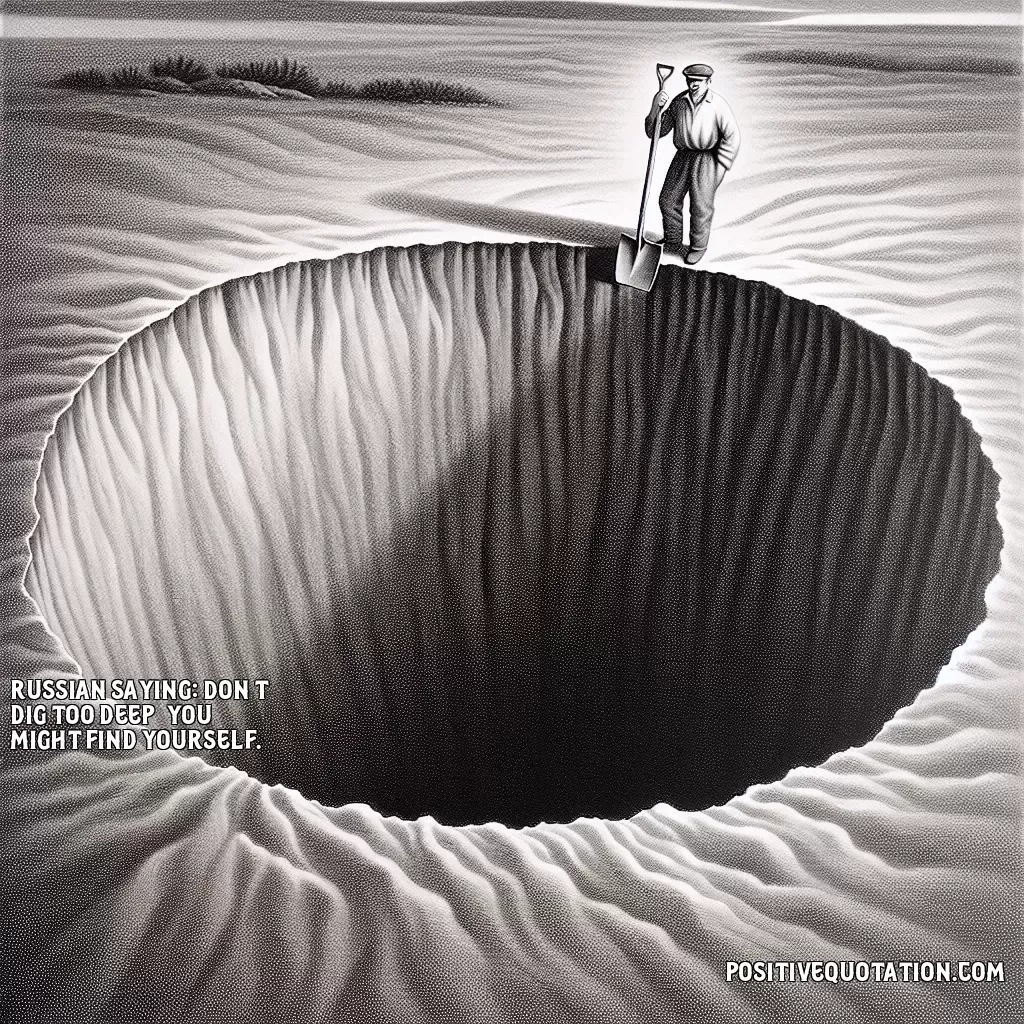
Russian Saying: Don’t dig too deep you might find yourself.
Author: Russian Saying
👁️ 22 views
The Russian saying “Don’t dig too deep, you might find yourself” is a thought-provoking adage that draws attention to the complex nature of self-exploration and introspection. On the surface, the saying warns against excessive probing or delving too deeply into matters, suggesting that doing so could lead to unexpected or unwelcome discoveries. Metaphorically, digging too deep can refer to an intense examination of one's inner self, psyche, or past. When people decide to dig into the depths of their minds or emotions, they're often seeking truth, understanding, or personal growth. However, the process is not without its risks and challenges. The saying implies that through this exploration, one might unearth parts of themselves that are difficult to accept or confront. Such discoveries might include repressed feelings, long-buried memories, insecurities, or aspects of one’s identity that have been hidden or denied. This saying can serve as a cautionary note about the potential consequences of soul-searching. Digging into oneself can lead to profound self-awareness and transformation, but it can also bring discomfort and inner turmoil. The outcome of such exploration can be enlightening and lead to personal growth, but the journey may be fraught with challenges, requiring courage and acceptance. In sum, the saying underscores the dual nature of introspection: the pursuit of self-discovery is as likely to yield uncomfortable truths as it is to provide enlightenment and clarity. It is a testament to the complexity of the human experience and the intricate layers of the self.
Quote By: Russian Saying
**Russian Sayings: A Cultural Tapestry**
Russian sayings, or "пословицы" (poslovitsy), are an integral aspect of the rich cultural heritage of Russia, serving as a window into the values, humor, and wisdom of the Russian people. These pithy phrases, often steeped in metaphor and allegory, encapsulate the collective experiences and historical lessons of generations. Through their vivid imagery and keen observations on life, Russian sayings convey moral lessons, practical advice, and reflections on human nature.
One of the most renowned aspects of Russian culture is its language's ability to convey complex ideas in a succinct manner. Russian authors like Anton Chekhov and Leo Tolstoy have famously utilized these sayings in their literary works, enhancing their narratives with traditional wisdom. Chekhov, in particular, would weave Russian sayings into his characters' dialogues, allowing readers to grasp the poignant truths behind everyday life. Through the lens of Russian sayings, Chekhov and his contemporaries painted a clear picture of socio-political realities, class struggles, and the nuances of human relationships in their narratives.
Russian sayings often reveal the psyche of a nation shaped by a turbulent history of war, oppression, and resilience. For example, the saying "на безрыбье и рак рыба" ("In the absence of fish, even a crawfish is a fish") reflects the pragmatism that has characterized the Russian spirit, emphasizing adaptability during tough times. Similarly, "Бережёного Бог бережёт" ("God protects the one who takes care") illustrates the value placed on responsibility and foresight, encouraging individuals to act wisely in their endeavors.
The richness of Russian sayings lies not only in their content but also in their oral tradition, passed down through generations. Russians often utilize these sayings in casual conversations, imparting wisdom in a humorous, relatable way. As a result, Russian sayings remain a vibrant and living part of contemporary culture, bridging the past with the present.
In essence, Russian sayings are more than just colorful expressions; they are a testament to the resilience, creativity, and depth of the Russian spirit. Their continued relevance in modern discourse highlights the enduring power of language and tradition in shaping a culture's identity, reminding us that the wisdom of the past continues to guide us in our everyday lives.